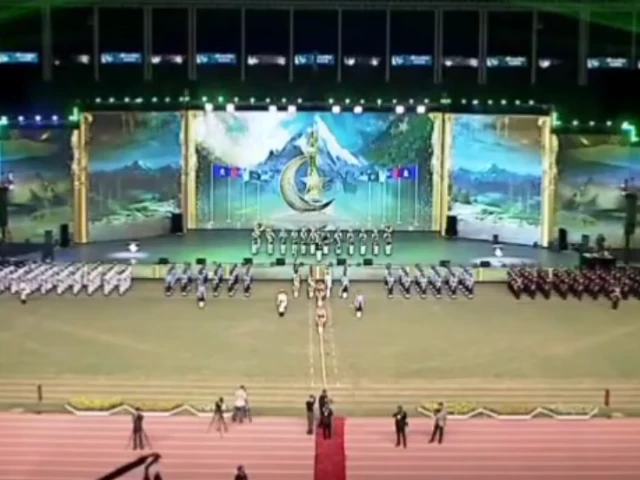PM calls for national unity under 'Misaq-e-Istehkam-e-Pakistan' on 78th Independence Day
Sharif announces new Army Rocket Force Command with advanced tech and multi-directional capabilities to boost strength

Prime Minister Shehbaz Sharif urged all political parties, stakeholders, and civil society members to unite under a new national charter, Misaq-e-Istehkam-e-Pakistan (Charter for Stability of Pakistan), as the nation celebrates 78th Independence Day and military success against India in Marka-e-Haq.
Addressing a ceremony in the federal capital on Wednesday, attended by President Asif Ali Zardari and Chief of Army Staff Field Marshal Syed Asim Munir as guests of honour, he said that the time had come to rise above political divisions, personal interests, and hollow slogans in pursuit of national unity.
“On this historic day, I once again invite all political parties, stakeholders, and civil society to become part of the Misaq-e-Istehkam-e-Pakistan. This is not merely a continuation of the Misaq-e-Maishat, but a broader commitment to national interest — so the world may witness that while our differences remain, we stand united for our beloved Pakistan,” the premier said.
Dedicating this year’s Independence Day to the country’s military success in Marka-e-Haq, Sharif said the aggression launched by India under a false narrative had been met with a resolute response. “They believed they could defeat Pakistan, but forgot that wars are not won by weapons alone. It is the courage and valor of those who dare to face the battlefield that secures victory,” he added.
PM Shehbaz praised the leadership of Field Marshal Munir and other top military commanders for what he termed a “swift and decisive response” to India’s recent provocation.
“In just four days, India was reduced to dust, as it faced a determined military backed by brave and capable commanders — Field Marshal Asim Munir, Chairman Joint Chiefs of Staff Committee General Sahir Shamshad Mirza, Air Chief Marshal Zaheer Babar, and the Naval Chief. Under their command, soldiers taught India a historic lesson that future generations will remember,” he said.
He stated that the military strategy devised under Field Marshal Munir had been widely recognised by both allies and adversaries. “Just as a new state was born on 14 August 1947, a renewed nation rose on 10 May 2025. Marka-e-Haq proved our ability to defend the hard-won freedom secured by our forefathers,” he added.
The PM also announced the establishment of a new military division, the Army Rocket Force Command, which, he said, would be equipped with advanced technology and multi-directional capabilities. The force, he added, would significantly strengthen Pakistan’s conventional warfare capacity.
Reaffirming Pakistan's strategic position as the world’s seventh and only Muslim nuclear power, he said the country’s nuclear programme had always been a deterrent, not a symbol of aggression. “Our nuclear capability was developed solely to counterbalance India’s nuclear ambitions and to strengthen our national deterrence,” he added.
Sharif paid tribute to the vision of former prime minister Zulfiqar Ali Bhutto and the contributions of Dr Abdul Qadeer Khan, scientists, engineers, and the armed forces, noting that their sacrifices and efforts would be “remembered in golden words.”
Acknowledging the role of Pakistan’s international partners during the recent military escalation, the premier said the support extended by “trusted and brotherly nations” played a crucial role.
“Our friends rejected India’s baseless propaganda and stood by Pakistan on the diplomatic front. We are especially grateful to China, Saudi Arabia, Türkiye, Azerbaijan, the United Arab Emirates, Qatar, and Iran for their clear and consistent support,” he added.
The PM also expressed gratitude to US President Donald Trump for what he described as a constructive role in facilitating a ceasefire during heightened tensions.
“I thank President Donald Trump and his team for playing a positive and meaningful role in securing a ceasefire. I sincerely hope that he will also support the resolution of the Kashmir dispute in line with United Nations resolutions and the principles of justice,” he added.
Earlier, the ceremony began with the recitation of the Holy Quran, followed by an impressive tri-services parade by the Pakistan Army, Navy, and Air Force, showcasing military precision and national pride. The programme included special cultural performances, a flypast, and a parade by the armed forces.
Military contingents from Turkiye and Azerbaijan also participated in the celebrations, symbolising strong ties with friendly nations. A large number of national and international dignitaries were present at the event, which was broadcast live across various platforms.
Operation Marka-e-Haq
Tensions between India and Pakistan escalated after the April 22 attack in Pahalgam, Indian Illegally Occupied Jammu and Kashmir (IIOJK), which killed 26 people. India blamed Pakistan-based elements for the assault but provided no evidence. Islamabad strongly denied the allegations.
The Pakistan Armed Forces conducted Operation Bunyanum Marsoos on May 10 as part of the military conflict 'Marka-e-Haq' in response to Indian military’s dastardly attacks that began on the night of May 6 and 7, resulting in the loss of innocent civilian lives, including women, children, and the elderly.
The confrontation erupted on May 6–7 as India launched its attack against Pakistan, that spiralled into the gravest military clash between the neighbors in decades. Dozens were killed before diplomacy prevailed.
Despite repeated warnings from the Pakistani government, India, fueled by its media's war-driven rhetoric, continued provocative actions, including frequent drone incursions, which ultimately prompted Pakistan to retaliate.
Pakistan intercepted multiple BrahMos supersonic missiles before launching the military operation on May 10, deploying its Al-Fatah missile system and targeting multiple Indian military installations. Key targets included BrahMos storage facilities at Beas and S-400 air defence systems at Adampur and Bhuj.
Moreover, the Pakistan Air Force shot down six Indian jets, including French Rafale, and carried out strikes on several Indian airbases. Following these developments, India requested intervention from US President Donald Trump, which ultimately led to a ceasefire agreement between the two nuclear-armed neighbours.




















COMMENTS
Comments are moderated and generally will be posted if they are on-topic and not abusive.
For more information, please see our Comments FAQ